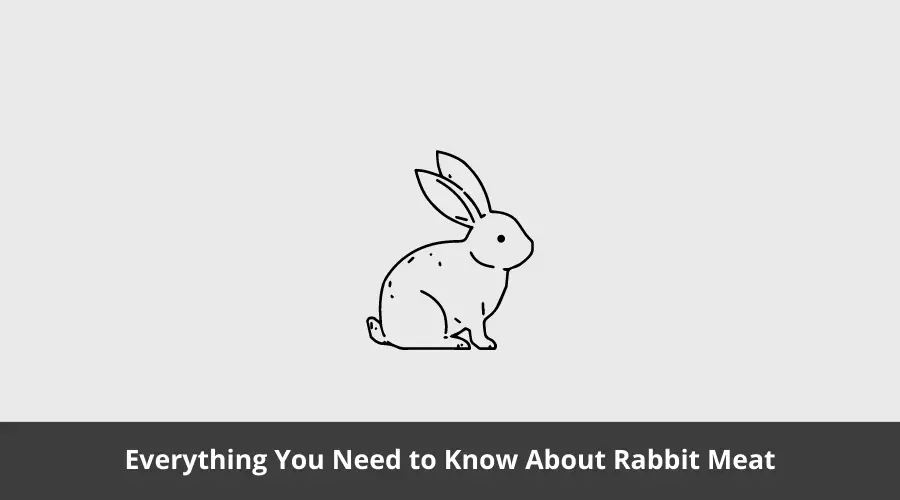Last Updated on August 9, 2023
Raising your rabbits for meat is quite simple and even pays off in the end. And just with a few materials and everyday care, it can be a striking way to learn more about taking care of your animals. Moreover, a single doe can easily give you somewhere around 300 pounds of meat each year just through her young. This is because rabbit breeds can get a lot out of their food and they won’t even stretch your pockets.
So, here in this blog, we’ll let you know all the ins and outs regarding rabbit meat and its possible good sides and certain drawbacks. Binge on till the end to know it all!

The Rabbit Breeds That Make an Astounding Rabbit Meat: An Overview!
If you want to raise rabbits mainly for their meat, Californians and New Zealanders are the two most popular breeds. Rabbit enthusiasts like these breeds, as they tend to have bigger litter and are pretty well-shaped, youngs that can simply be lovely for meat.
And if you go for other well-known breeds like Flemish Giants and Chinchillas, they’re massive in size, but can take ages to grow the “hefty meat” you need. The reason is, they mainly focus on body growth rather than meat!
Although, there are rabbit owners who had success taking in Flemish Giant as a male with a New Zealand female as it has big, fast-growing children. Now, if you’re new to breeding rabbits, experts always recommend that it’s best to start with a pair or three of a normal meat breed until you know the drills.
While you proceed with the “meating experiment,” you can learn about other breeds like Silver Foxes, or Altex as they can come in handy for you!
But, no matter what, it’s a must that you initially seek the assistance of expert breeders to raise your rabbit meat success. These experts can aid you pick healthy rabbits that are perfectly healthy and can even guide you with the right rabbit diet, which will also reduce your costs.
Top 4 Rabbit Meat Benefits: Number 2 is a Must-to-Read!
In this section, our rabbit breeding experts have listed all the top 4 benefits that you can get from rabbit meat. So, make sure not to skip any of the following points.
Rich in Protein
High-quality protein can be found in rabbit meat. Amino acids are the building blocks of our bodies, and proteins are made up of them. These are pretty important for tissue repair and growth, as well as for making hormones, enzymes, and many more.
Packed With Minerals and Vitamins
Not everyone is aware of it, but rabbit meat is packed with essential vitamins and minerals. For instance, it comes with vitamin B12 in abundance, which plays a pivotal role in making RBC (red blood cell) and nerve activity.
Selenium, another essential nutrient that aids in protecting our cells from certain damage, is also found in these rabbit meat.
That’s not all; rabbit meat also has nutrients like zinc and iron, along with phosphorus, which is responsible for making bones and teeth strong.
Few Calories and Cholesterol
Compared to beef, lamb, and pork, rabbit meat doesn’t have that much fatty content. Those who want to lose weight, lower heart disease chances, and even improve their overall health are often told to eat less fat.
So, by going for rabbit meat, they can now still eat tasty meat while keeping their fat intake in check.
Plus, rabbit meat is naturally low in cholesterol, which makes it a good choice for people who have high cholesterol. If you choose rabbit meat over such meals with a lot of cholesterol, it can keep the heart healthy.
Astounding Choice for Those on Special Diets
Rabbit meat is often part of special diets as it is pretty low in any “health-wracking” substances. For instance, it can be part of a meal for diabetic patients because it won’t actually cause their blood sugar levels to rise.
Also, rabbit meat is good for people with certain heart issues and those who want to eat a well-balanced and healthy diet.
Possible Rabbit Meat Disadvantages: Low Fat, Yet Cholesterol Risks?
The section here will talk about the possible setbacks you’re likely to face with rabbit meat. Ensure to skim through till the end!
Too Low Fat Content
As already mentioned, rabbit meat is famous for its low fat content, and this surely proves remarkable for those who are on “fat diet.”
But this rabbit meat might not be a good choice for those who are in need of more fat in their diets, like athletes or even people who follow certain diet plans.
Fat is essential for many things in the body, like absorbing nutrients, making hormones, and giving the body a concentrated “energy source.”
Taste and Toughness
Rabbit meat is known for being super lean, which can make it less tender than those with more fat. But this lean meat can be an issue for those who like their meat to be slightly more juicy and soft.
All Rabbit recipes are here
Plus, some people may find that rabbit meat has a different taste than other meats they are used to, which could make them like it less than other kinds of meat.
Limited Availability
Rabbit meat might not be as easy to find like chicken, pork, or even beef, which are more widely eaten. Meat lovers might find it hard to eat rabbit meat on a regular basis, even if they want to try it for its possible health benefits.
Lower Iron Content
In general, rabbit meat contains less iron than any red foods like lamb or beef. Iron is one of the most essential nutrients that’s responsible for making hemoglobin.
So, people with iron-deficiency anemia or who are at risk of iron deficiency may need to eat iron from other sources to meet their regular needs.
Allergic Reactions
Like any other food, rabbit meat can make some people sick if they are allergic to it. Rabbit meat allergies are rare, but people who have never eaten it before should be careful the first time they eat it. Some of the signs of an allergic response are itching, hives, swelling, trouble breathing, or stomach problems. If someone thinks they might be allergic to rabbit meat, they should go to the doctor right away.
Things You Must Consider While Raising Rabbits for Meat
The section here will guide with the things you need to consider while you raise your rabbits for meat.
Housing and Space Needs
Rabbits that are grown for meat need a safe and comfortable place to live. The cage should have enough space for the rabbits to freely move around, stretch, and stand on their back legs.
A well-ventilated area is important to keep ammonia from building up and to keep the air moving, which is good for the rabbits’ health as a whole.
Wire-bottomed cages are often used as they are easy to clean and have places for the rabbits to rest, like boards or mats.
This space must be warm, dry, and lined with soft materials like straw or hay to make a cozy place for the baby kits.
Getting the Right Food
Since rabbits are vegetarians, they need a diet high in fiber to help them digest their food. Their food should be based on high-quality hay which helps keep their teeth and digestive system healthy.
Along with hay, give them rabbit pellets that are made for meat bunnies and can be bought from a store. These pellets have the right amount of protein and nutrients for fast growth and muscle building.
Fresh veggies should also be added to their diet to give them more nutrients and variety. But offer new foods slowly to keep the digestive system from getting upset. Don’t give rabbits things that are high in sugar or starch, as these can prove detrimental for their health.
Health Care
Check the rabbits for signs of sickness, damage, or parasites on a regular basis. Rabbits often get respiratory illnesses, problems with their stomachs, and problems with their teeth.
Consult a vet who knows how to take care of rabbits right away if you have any health issues.
To keep diseases and germs away, it’s important to keep your living space clean. Clean the pens or hutches every so often to get rid of waste and dirty bedding.
The Overall Growth
Rabbits grow quickly and can usually be “harvested” when they are 10 to 12 weeks old. But it may take longer for some breeds to get to the right size and weight. It is important to keep an eye on their growth and weight on a daily basis to figure out when to harvest them.
So, it’s important to know the right and proper ways to process meat for ethical and humane slaughtering. This could mean putting the rabbit to sleep first, so it doesn’t feel stressed or in pain, before taking it. Ask an expert rabbit farmer or a professional for help with this.
Breeding Program
To make a great breeding program, choose rabbits with traits that make them good for making meat.
Look for things like a fast growth rate, a big body, and a good amount of meat to bones. Some popular rabbit types for meat are the New Zealand White, the Californian, and the Flemish Giant.
Research the features of different breeds and talk to experienced breeders to learn how to choose the best breeding stock.
To keep the herd healthy and prevent inbreeding, it is important to have a lot of different genes. Every so often, bring in new breeds to improve the quality and health of the herd.
Transformation and Storage
After the meat is caught, it must be processed correctly to make sure it is safe and of good quality. This means taking out the innards, skinning the body, and cutting the meat in the right way.
You can learn how to do this by reading books, watching lessons online, or asking people who have done it before for help.
To keep the meat from going bad and to keep its quality, it’s important to store it the right way. Fresh meat should be kept in the fridge and used within a few days, or it can be frozen to keep it longer.
Where to Buy Rabbit Meat?
Now, want to buy rabbit meat? Well, there are certain places you can start looking for. The section here will cover them in detail.
Local Farms
Local farms that raise rabbits for meat can be a great place to get fresh rabbit meat that was raised in a healthy way. When you buy straight from the farm, you can see how the rabbits are raised and learn more about how they are doing.
Prices at local farms may change based on things like the breed of rabbits, the quality of their food, and the state of the local market.
E-Commerce Stores
You can buy rabbit meat from a number of internet stores and specialty food sites. This is a good choice if you don’t have any nearby suppliers.
But if you buy online, you may have to pay more for shipping, and it’s important to make sure that the seller handles and ships the meat correctly so that it stays fresh.
Butcher Shops
Some specialty butcher shops or meat stores cater to customers who are looking for unique and high-quality meats.
They might have a special item like rabbit meat. Since these shops usually try to find high-quality items, the price of rabbit meat here might be higher than at other places.
Raising Rabbits for Meat!! How to Begin!
Bottom Line
So, after going through this blog, you should now know all the ins and outs about rabbit meat. Indeed, rabbit meat comes with good sides and certain health derailments, but in the end, the benefits are in abundance.
And when it comes to getting the right quality meat, you need to look through certain factors when raising the rabbits for meat.
Nevertheless, it’s always recommended that you take the help of experts and professionals before beginning to raise rabbits to get good quality meat.







